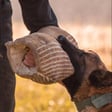Become a Creator today!Start creating today - Share your story with the world!
Start for free
00:00:00
00:00:01

Cory - Stevens Bee Company
This interview was the bees knees! If you love honey, (who doesn't), and you wonder where that honey comes from, why bees are important, and what all goes into maintaining a vital part of our nations agricultural health, you gotta hit play on this episode of the Jobs Podcast. Cory is full of knowledge about bees, honey and making money with both. We have a lot of fun in this one because education should be fun. Thanks Cory, your interview was SWEET!
Cory and his products can be found HERE.
If you liked this interview and want to support the show, you can do so HERE. Thanks!
Transcript
Introduction to the Podcast and Guest
00:00:01
The Jobs Podcast
Hey folks, you're listening to the jobs podcast. I'm your host, Tim Hendricks. As always, your time is valuable. I'm not going to waste it blabbing on. Let's get right to the interview. Today we have Corey with us. Corey runs Stevens Bee Company out of the great state of Missouri, the same state that I'm in.
00:00:18
The Jobs Podcast
And he's going to be our guest today to talk about all things apiary and bees and honey and the whole nine yards. So we'll figure out what all the buzz is about. Sorry, Corey, that was ah
00:00:31
The Jobs Podcast
i'm I'm obligated as a dad to make those jokes or I lose my new balance and Weber grill discounts. so like ah
00:00:37
Cory Stevens
I'm in the same boat. I understand.
Corey's Background and Beekeeping Journey
00:00:40
The Jobs Podcast
So go ahead and start, give us ah a little bit of history of Corey, where were you were born and and early influences and kind of your first exposure to beekeeping.
00:00:49
Cory Stevens
Yes, well, I'm a Missouri boy, as you mentioned, from Southeast Missouri. and I'm from Dexter originally.
00:00:56
The Jobs Podcast
Hmm.
00:00:56
Cory Stevens
If anybody knows where Dexter's at in Southeast Missouri, it's about 45 minutes southwest of Cape Girardeau, if you're familiar with that.
00:01:05
The Jobs Podcast
Okay.
00:01:07
Cory Stevens
um you know Pretty typical childhood, good childhood. i mean, had a stable home. Parents are still together. ah They were high school sweethearts.
00:01:18
Cory Stevens
Kind of a leave-it-the-beaver scenario. you know I went to a little country church where I was raised, and both my grandparents actually went there, both sets, mom and dad, so
00:01:29
The Jobs Podcast
Hmm.
00:01:32
Cory Stevens
Yeah, if there's anything I want to stray on, I can't blame my childhood. It was definitely me.
00:01:37
The Jobs Podcast
Yeah.
00:01:39
Cory Stevens
Yeah, how I got exposed to bees. Well, whenever I was really young, my mom said I should be an entomologist. Whenever I grew up, which is funny, I ended up getting a master's in entomology, so she was right there. But my exposure to bees specifically came when my dad and my brother had bought some beehives.
00:02:03
Cory Stevens
They knew someone that had had some success with it. They had a day job too, but they were running a lot of colonies, um you know, had made some profit at it. They wanted to give it a shot.
00:02:16
Cory Stevens
I think it was one of those that looked better on paper ideas. Once they got into it, you know, they kind of started losing interest in it.
00:02:21
The Jobs Podcast
Right.
00:02:24
Cory Stevens
And, but I'm glad that they got those because I don't know, you know, when I would have ran across them and I got to dig and, and colonies and inspect them. And looking in there, I was just completely hooked once I got in one.
00:02:37
Cory Stevens
And rest is history. I started getting my own and ended up with theirs.
00:02:41
The Jobs Podcast
How old were you when that? How old were you when that happened?
00:02:45
Cory Stevens
I was in my 20s already, let me think.
00:02:47
The Jobs Podcast
Okay.
00:02:49
Cory Stevens
We already had kiddos. Jade was around and Camden was a little bitty. He's 18 now.
00:02:56
The Jobs Podcast
Okay.
00:02:57
Cory Stevens
ah So, you know, I've been at it a little while. But... Yeah, that's how I got started. I remember looking through it and I found queen cells. That's how you know a colony is going to swarm. They start making new queens. And I told dad, hey, you better do something with that colony or they're going to have a bunch of bees flying around.
00:03:15
Cory Stevens
And they his house was 100 yards at least away from it. And he said, yeah, I'll get to it. Never did. They swarmed into the side of his house.
00:03:26
The Jobs Podcast
Oh, brother.
00:03:26
Cory Stevens
And I think they're still there, actually.
00:03:28
The Jobs Podcast
Oh my goodness.
00:03:29
Cory Stevens
Yeah, all these years later. so i As a side hobby, I just kept building it up.
00:03:32
The Jobs Podcast
So did you always, did you just shift gears and go right into beekeeping then, or did you take another path career wise and just kind of bee stuff as a side hobby?
00:03:47
The Jobs Podcast
and Okay.
00:03:49
Cory Stevens
i you know Like I mentioned, I had a young family at the time. um I had to I'm more of a bird in the hand kind of a guy. So whatever's paying the bills, that's where the majority my effort's going to go.
00:04:01
Cory Stevens
And then in my off time or supposed leisure time, I was working and doing other things.
00:04:01
The Jobs Podcast
What
00:04:09
Cory Stevens
But the bees were a part-time deal, and then they gradually just kept growing. you know The market grew for demand for what I was up to, my specific bee breeding program.
00:04:20
Cory Stevens
And then it just got to where I had to choose. Really, it was... you know, i either had to back off the bees or look at leaving my day job.
00:04:29
The Jobs Podcast
what was your day job?
00:04:31
Cory Stevens
I was a senior transportation representative for Nestle Purina Pet Care. Um, they have a large factory here pretty close to where I'm at within 15 minutes and I live out in the middle of nowhere. So that's nice, close to my, my hometown.
00:04:46
Cory Stevens
And, uh, yeah, that's where it started. I'd worked there for 15 years before uh, quit full-time to do bees, and that was March 1st of last year.
00:04:59
The Jobs Podcast
man.
00:04:59
Cory Stevens
And, you know, prior to that, I was in transportation and logistics a lot, management roles, typically, you know, dock worker while I was working on my bachelor's degree, backing in trailers, you know, I've done all that.
00:05:13
The Jobs Podcast
What was the reception that you got when you let your current employer know, hey, I'm going to be stepping away from my current position and I'm going to do this B thing full time?
00:05:25
Cory Stevens
My supervisor was really supportive. she
00:05:27
The Jobs Podcast
Oh,
00:05:29
Cory Stevens
I gave him a one-year notice, actually.
00:05:31
The Jobs Podcast
Oh, okay.
00:05:32
Cory Stevens
And so she kept checking in with me like, are you sure? people want You're welcome to change your mind, but you know we would love to keep you around.
00:05:39
The Jobs Podcast
Yeah.
00:05:41
Cory Stevens
ah But whenever i I set a date, I stuck with it. So you know I wanted to give them time to prepare, not burn the bridge, because I spent a lot of my life there.
00:05:52
Cory Stevens
ah yeah
00:05:52
The Jobs Podcast
Mm-hmm.
00:05:54
Cory Stevens
They're a big company, a lot of opportunity, so I definitely didn't want to burn that bridge.
00:05:58
The Jobs Podcast
Well, it's nice when you've got a ah good relationship to where you're being fair to them and they're going to return that favor.
00:05:58
Cory Stevens
but
00:06:03
Cory Stevens
Absolutely. Yep.
00:06:04
The Jobs Podcast
Yeah.
00:06:05
Cory Stevens
I mean, bees, it's agriculture. I knew full well you know the risk I was stepping into.
00:06:12
The Jobs Podcast
Mm-hmm.
00:06:12
Cory Stevens
And so I figured, which I've never um never burnt bridges with an employer ah in case you had to backtrack where you needed a reference from them. It's just not not a great policy.
00:06:23
Cory Stevens
In my estimation.
00:06:23
The Jobs Podcast
Yeah. I remember my dad always telling me, he says, you know, telling off a bad employer feels good for about five minutes. But when you need that, that reference, it's, it's better just to find something else and move on if that's the the time that you're in, as opposed to just burning that bridge.
00:06:39
Cory Stevens
That's exactly
00:06:42
The Jobs Podcast
No need to make enemies needlessly.
00:06:42
Cory Stevens
yep
00:06:44
The Jobs Podcast
So, yeah.
00:06:44
Cory Stevens
That's some wisdom from dad.
00:06:47
The Jobs Podcast
So let's go back to the early days in
Understanding Beekeeping and Bee Behavior
00:06:50
The Jobs Podcast
bees. What was it about the just the beehive? Was it the honey? Was it the, the maneuvering and the movement of the insect itself? Or what was it that really drew you into bees? Or was it just everything?
00:07:06
Cory Stevens
I think it was all of it. I think honey was kind of the, ah just a cherry on top. I was more interested in the the insects and how the hive functions itself.
00:07:16
The Jobs Podcast
Hmm.
00:07:18
Cory Stevens
I always tell people I'm a wildlife biologist at heart. So I always loved, you know, learning about plants and trees and things of that nature.
00:07:22
The Jobs Podcast
Okay.
00:07:28
Cory Stevens
And then once I figured bees out, it gave it a whole new dimension because the two interlay nicely. You know, the stuff you wouldn't even think about that's in your yard or in a fence line, you know, trees, shrubs, you know, people think about flowers as, you know, roses and tulips and that kind of stuff. But there's so much ah diversity in wild trees and whatnot that they get pollen and nectar from that it really opens your eyes to, you know, the environment a bit more.
00:08:00
Cory Stevens
And then whenever you dig through that, I say dig through it. You know, if you look at a beehive, there's frames in there.
00:08:06
The Jobs Podcast
Okay.
00:08:06
Cory Stevens
So a standard box will have about 10 frames and you can pull them out and look at them. And so I looked at it kind of like reading the pages of a book because you can tell if there's nectar and pollen coming in or not coming in and then the bees will react to that. So it's really dynamic and constantly changing and just what they do and how they do it is just mind blowing.
00:08:31
Cory Stevens
really seeing all the different colors of pollen coming in And then once they start getting that protein, the brood nest and the hive will expand, you know, and then they'll ah swarm oftentimes, like I mentioned.
00:08:44
Cory Stevens
That's quite a spectacle if you've never witnessed it. it It could be terrifying if you don't know what's going on, but magical if you do. Yeah.
00:08:54
The Jobs Podcast
Well, I think some people, you know, they they kind of bunch up bees, wasps, yellow jackets, which they have an awful attitude. We had some in our crawl spaces last year, but they kind of, because they can sting and there's a million of them, they just kind of seem to, you know, bunch them in.
00:09:02
Cory Stevens
I agree.
00:09:07
Cory Stevens
No.
00:09:09
The Jobs Podcast
But bees are, you know, it's, I've kind of warmed up to bees a little bit. Wasps are still jerks and I don't, I don't care for them one bit.
00:09:16
Cory Stevens
i agree
00:09:18
The Jobs Podcast
But, you know, I think they're not just going to randomly sting you. There's typically a reason why they're going to do that.
00:09:22
Cory Stevens
no
00:09:24
The Jobs Podcast
And you watch some of these YouTube videos. When I was preparing for an interview, I was trying to do some research on apiaries and beekeeping. And it always impresses me. You'll see those guys out there that they may have a hood on, but some of them will just have nothing but jeans and a t-shirt.
00:09:40
Cory Stevens
Mm-hmm. Yep.
00:09:41
The Jobs Podcast
And there's bees everywhere. And I think that's a mental hurdle you probably have to get over and go, I know what's going on.
00:09:42
Cory Stevens
Oh, yeah.
00:09:49
The Jobs Podcast
And I know that I'm not in any danger.
00:09:52
Cory Stevens
Yep, you're exactly right. And I mean, you can still get stung. So even if you've got a suit and even if you've got gloves on, um occasionally they can find a way, especially if you get them really agitated.
00:10:02
Cory Stevens
But it's
00:10:03
The Jobs Podcast
Yeah. Yeah.
00:10:04
Cory Stevens
I don't know. I feel like they're kind of like horses too. I hear some people say that they know if you're scared and like they'll act differently.
00:10:09
The Jobs Podcast
yeah
00:10:13
Cory Stevens
Bees are the same way. Like if you go in there and you're calm and you're fluid moving, you're not jerking and slapping or spotting, you know, ah stuff like that.
00:10:24
The Jobs Podcast
yeah
00:10:26
Cory Stevens
They just, they completely react different. So I typically don't wear gloves. um Because I'll handle the queens oftentimes, marking them so I know how old they are. You know, I keep track of who their mother is.
00:10:39
Cory Stevens
um So it's important for me to be able to handle them. And you can't safely handle a queen with a big pair of rawhide or leather gloves on. it It's just not possible. But yeah, just being calm and and walking through there.
00:10:50
The Jobs Podcast
Mm-hmm.
00:10:53
Cory Stevens
And some people hear that buzz and it terrifies them. I mean, justifiably so in some instances, you might need to run. You might need to run. But it calms me for some reason, that buzz and that hum of them working.
00:11:08
Cory Stevens
If they're angry, it's a different, it's a higher pitched buzz and they'll let you know they're not happy. But when everyone's happy, they're working, they're eating good. It's just a real calming hum.
00:11:20
Cory Stevens
I love it. The birds chirping, the sun shining, it's hard to beat.
00:11:24
The Jobs Podcast
that's That's your slice of heaven, isn't it?
00:11:26
Cory Stevens
It is, yes.
00:11:28
The Jobs Podcast
You know, the thing when I was watching some of these YouTube videos, I would see these folks and I would see just a pile of moving bees and they would say, oh, there's the queen.
00:11:37
Cory Stevens
Yep.
00:11:38
The Jobs Podcast
And I'm like, how i they all look exactly the same.
00:11:38
Cory Stevens
Yeah.
00:11:43
The Jobs Podcast
how How do you, I mean, that just takes experience. Your eye is just, I know, what but what is the what is the differing identifier?
00:11:47
Cory Stevens
yeah
00:11:53
The Jobs Podcast
What is that one thing that lets you go? That's the queen. Is it the length or?
00:11:56
Cory Stevens
Her, yeah, her length, although like if she slows down egg laying, like if there's not a lot of nutrition coming in or they're about to throw a swarm and the queen will stop laying, her abdomen will shrink down.
00:12:04
The Jobs Podcast
Yeah.
00:12:08
Cory Stevens
That makes them a lot harder to see because that large, longer abdomen when it's full of eggs really stands out. And her thorax, her midsection ah does too.
00:12:19
Cory Stevens
It's wider than a worker bee's and it's usually a shinier you know, where the worker bees will be a little bit fuzzier. So she's just a little bit bigger. Another thing, like the drones or the males in the colony, they're larger too.
00:12:34
Cory Stevens
So they'll catch your eye. I think my eye picks up variation really well. You know, like if I look out in a patch of clover, I pick out four-leaf clovers pretty quickly.
00:12:48
Cory Stevens
I think it's just my brain picks up something that's different out of a crowd,
00:12:54
The Jobs Podcast
Their markings, the markings will be the same though.
00:12:54
Cory Stevens
so to speak. Yep.
00:12:57
The Jobs Podcast
i mean, the size will be different, but the striping.
00:12:58
Cory Stevens
a No, they're not. The ones I have, the workers are striped, but the queens are more of an orange or like a deep reddish color. um So they they stand out a bit more, but that depends on the bees because I've got some, you know, from feral,
00:13:16
Cory Stevens
or wild stock that I've worked with that are striped similarly to a worker, but it's different. It's like thicker banding. And then some queens are just really dark, you know, their abdomen too. And those are those are definitely harder to pick out.
00:13:32
The Jobs Podcast
Is it a does that vary hive to hive? If you go to a different state, you'll see different coloring.
00:13:36
Cory Stevens
oh yeah.
00:13:39
Cory Stevens
Yeah, it just depends on the type of bees. You know, we've got different subspecies. Most of the bees in the U.S. are a mix of the main subspecies, like Italians. Those are typically like your stereotypical yellow, orange-looking honeybee.
00:13:55
Cory Stevens
ah That's what people or beekeepers would call an Italian, even though it's probably a mixture.
00:14:00
The Jobs Podcast
I see.
00:14:01
Cory Stevens
And then you've got a couple other races, like Caucasian or Carniolan. ah from Europe too, but they're darker bee with slightly different characteristics. So it's just like cattle or any other organism, you know, you've got a lot of variation in them.
00:14:17
The Jobs Podcast
i
00:14:17
Cory Stevens
Some of them can be really aggressive, um like Africanized bees or even some just feral stock or bees that people work with and they just get agitated quicker.
00:14:28
Cory Stevens
So, you know, most people like to work with a calm bee. ah They're better for the neighbors too, of course. And more fun.
00:14:35
The Jobs Podcast
i don't I don't remember when it happened, but it was those killer bees were all the rage for a while there. what was that, about 10 or 15 years ago? Something like that.
00:14:44
Cory Stevens
Yep.
00:14:45
The Jobs Podcast
Was that just a flash in the pan? that has Has that issue been put to bed, or are they not as big of a deal as we thought?
00:14:54
Cory Stevens
I think whenever they started moving north and were out crossing a lot with the more gentle or calm European bees that we work with typically. I think they kind of calmed down, really. And also, it seems like they really like it warmer. You know, they were from Africa, Africanized bees, so they like a warmer climate closer to the equator. And the farther north you get, it's like quite a bit different.
00:15:23
Cory Stevens
You know, they I don't think they survive quite as well. So it's still a thing, especially in, like, South Texas, Mexico, South America. You know, and in some southern states, southern California, Arizona, you know, you
Challenges and Solutions in Beekeeping
00:15:38
Cory Stevens
can find pockets of ah Africanized bees still.
00:15:41
Cory Stevens
But a lot of them have interbred to where, you know, they're not not such a danger.
00:15:46
The Jobs Podcast
Can you recognize them if you just come up on them? Do they sound different, look different, or ah you don't know until it's too late kind of thing?
00:15:50
Cory Stevens
No. now Exactly.
00:15:54
The Jobs Podcast
Oh, geez. Okay. Note to self. My goodness.
00:15:57
Cory Stevens
ah Exactly. i saw a shirt one beekeeper had that said, I'm a beekeeper. If I'm running, you should run too. Right. Exactly. Oh, yeah.
00:16:06
The Jobs Podcast
ah Yeah, it's the same thing with the zookeeper. That would be, yeah, yeah.
00:16:09
Cory Stevens
ah six oh yeah
00:16:13
The Jobs Podcast
So yeah let's jump back. I love going down these rabbit holes, but you are fascinated with bees. You've been working with them for 15 years. You've changed gears now and you are leaving your day job, so to speak.
00:16:30
The Jobs Podcast
You're going to open up your own company. What is Stevens Beekeeping? What I say, what do you do? I know that's pretty broad thing, but lay it out, lay it out for me.
00:16:39
Cory Stevens
Yep. Sure. Certainly. Yep. Our main thing, our main source of income is queen bees. So we breed this. I don't want to get off too far in the weeds, but ah they we imported a mite in the late eighties, varroa mite that devastated a lot of our bee populations.
00:16:59
Cory Stevens
ah But there's, of course, genetic traits that we're ah now aware of that give them an edge. And so we we select for those naturally occurring traits that really give them ah an edge with might and diseases.
00:17:13
Cory Stevens
And so that's kind of been our niche, so to speak. um I ship queens all over the U.S. You know, before I left my day job, even, I got to where I was shipping about 2,000 queens a year.
00:17:25
The Jobs Podcast
wow
00:17:25
Cory Stevens
And I mean, 100%. It just seemed like, especially April, May, June, if I was awake, I was working. you know If I wasn't at Nestle, I was working bees and shipping queens.
00:17:38
Cory Stevens
yeah i don't you know As far as entrepreneurs that are looking at leaving a day job, i you know i I would advocate keeping your debt low and just suffering and outworking some of the competition until you can get to a point to where you know your living expenses are low enough and you know approximately what you're going to make.
00:17:52
The Jobs Podcast
Yeah. Yeah.
00:18:00
Cory Stevens
I guess it's a calculated risk is what I'm advocating for.
00:18:02
The Jobs Podcast
yeah yeah
00:18:04
Cory Stevens
And every business is different. B is being agriculture. You know yeah should plan for good years and bad years. And I'm sure a lot of industry is going to be the same way.
00:18:14
Cory Stevens
ah definitely would increase your chance of success. But yeah.
00:18:18
The Jobs Podcast
So you have a very much a feast famine kind of ah a cycle as far as.
00:18:22
Cory Stevens
Yeah, pretty much. April, May, June, we make most of our income. That's through queen bees. But we do harvest honey. um So we do have honey products. And my daughter started dabbling in wax products as well.
00:18:36
The Jobs Podcast
oh yeah.
00:18:36
Cory Stevens
ah So I'm sure we'll be expanding that. But, you know, our bread and butter is queens and bee breeding. So.
00:18:44
The Jobs Podcast
The mites that you mentioned a minute ago and the diseases, ah real quick, what are what are these mites do to bees and what are their typical diseases that hives can be affected by here in the United States mainly?
00:18:49
Cory Stevens
Mm-hmm.
00:18:58
Cory Stevens
Certainly. Yeah, those mites, they're a parasite. So, ah you know, it's kind of like having a tick on you. if you If you had a tick on you the size of your fist, that's...
00:19:11
Cory Stevens
That's about what a mite is on a honeybee.
00:19:12
The Jobs Podcast
Mites.
00:19:13
Cory Stevens
So they're a pretty decimating pest. They feed on ah the bees' fat bodies in their abdomen, which actually function, they have an immune function too and almost act as a liver.
00:19:28
Cory Stevens
So not good. and And also, like a lot of parasites, you know, they'll transmit ah viruses and bacterial issues ah from feeding on the bees. So ah that's that's what was killing a lot of colonies. If it wasn't the mites, it was the viruses.
00:19:45
Cory Stevens
um But we breed bees that'll sniff those mites out and throw them outside and throw the pupae outside, you know, before they get a foothold. ah The diseases that they are prone to, some people call it chalk brood.
00:20:01
Cory Stevens
um the It's a fungus and the bees, whenever they're developing into a bee, so they go from a larva to a pupa,
00:20:11
The Jobs Podcast
Mm-hmm.
00:20:11
Cory Stevens
They die and they just make these little chalk. It looks like a piece of chalk, little mummies, and they stick in the comb. But if you have bees that are really hygienic or detect issues and throw it out before it's a problem, then they take care of the issue themselves.
00:20:27
Cory Stevens
And some bees just have no idea what to do with it. They just succumb to it. So kind of crazy. American fowl brood used to be a bad one. i don't see it as much.
00:20:38
Cory Stevens
anymore. I've not seen it in my colonies, but basically they say if you see it, you should just burn the entire colony.
00:20:44
The Jobs Podcast
Really? Good grief.
00:20:45
Cory Stevens
Yeah, not good.
00:20:47
The Jobs Podcast
So these mites and these things, when these bees detect them and you you kind of have bounce, are they essentially bouncers at the entrance to the hive?
00:20:55
Cory Stevens
Yeah.
00:20:56
The Jobs Podcast
Do they just knock them on the ground or do they pick them up and take them away and dispose of them elsewhere?
00:21:03
Cory Stevens
Well, the guard bees definitely do that and shun foreign visitors, certainly. The actual, the ones that are detecting the mites and the diseases are nurse bees in the brood nest. So they're taking care of all the brood, feeding the larvae, and they'll patrol brood when it's capped, you know, before it they pupate, kind of like a butterfly goes into a chrysalis and then emerges.
00:21:28
Cory Stevens
ah Bees will do the same thing in a comb. And so they patrol that comb that's capped and the bees that are really resistant can, they know if something's wrong underneath that cap and they'll open it up and throw the whole pupae outside if it's sick or something's wrong with it.
00:21:45
Cory Stevens
So it's really miraculous.
00:21:46
The Jobs Podcast
how do they How do they know? is it ah Is it a pheromone or a scent? Oh, okay.
00:21:50
Cory Stevens
but Yeah, both, actually.
00:21:51
The Jobs Podcast
well okay
00:21:52
Cory Stevens
We know that whenever brood is stressed, it's just like people, you know, if you're sick, um something's wrong. A lot of people, I'm assuming people, organisms will emit a stress pheromone or that they're sick.
00:22:06
Cory Stevens
Those bees can detect sick brood and parasitize a brood if something's wrong, ah where a lot of bees are oblivious to it.
00:22:09
The Jobs Podcast
oh
00:22:14
Cory Stevens
So it's a genetic trait, quite interesting, but they smell it. It's olfactory for sure.
00:22:20
The Jobs Podcast
so they will essentially do they encapsulate whatever is in that i forget what the term is um
00:22:27
Cory Stevens
like a cell.
00:22:28
The Jobs Podcast
Yeah. Do they encapsulate it and basically just carry it out and dump it out the front of the, or do they send it to somebody else? like another bee that'll fly it out, you know, a certain distance away.
00:22:38
Cory Stevens
Yeah, some of them will open it like they know something's wrong and they'll open it and then others will come along like undertakers know that know that this brood sick it needs to be discarded and then you'll
00:22:49
The Jobs Podcast
Golly.
00:22:50
Cory Stevens
you'll see them pulling it outside and they'll some of them can fly with it and some of them try to fly and just land off in the grass outside the hive. But as long as it's outside the hive, that's the thing. Because if that sick brood emerges, I mean, the first thing that they do is clean their cell and then start feeding their sisters.
00:23:09
Cory Stevens
And if they're sick, you know it's just like, exactly, because they they feed each other through their tongues.
00:23:10
The Jobs Podcast
Yeah, I just spread it.
00:23:15
Cory Stevens
and So it'd just be like kissing someone with the flu.
00:23:19
The Jobs Podcast
and
00:23:19
Cory Stevens
And then going around the whole town. Not good. Oh, yeah.
00:23:22
The Jobs Podcast
No, it it, what, what is really interesting to me is I hear you talk, they have all of these unique positions. You have the nurses, you have the bodyguards, you got the queen, you got the, the undertakers, you know, and I mean, how do they, is it just a constant patrol of the hive or do they do a ah pattern?
00:23:29
Cory Stevens
Yes.
00:23:41
The Jobs Podcast
Like, you know, I'm checking my route now and they go around and up and down, up and down across a frame to see what's going on. Or is it just a randomness?
00:23:49
Cory Stevens
yes I think they're constantly are patrolling it, and it's crazy, too. Like, whenever they first hatch, like I mentioned, they'll clean their cell and clean.
00:23:58
The Jobs Podcast
Mm-hmm.
00:23:59
Cory Stevens
Then they'll eat a lot because they haven't eaten in a while. Then they'll start feeding brood. So it's a weird. Like, ah certain age groups have certain assignments. So you've got nurse bees. Those are young bees that are feeding brood and just patrolling the hive looking for stuff that needs to be fed. Then a little bit older, then they're more hygienic, ah carrying out refuse.
00:24:20
Cory Stevens
They'll start to fly. And then whenever they get a little bit older, those are the ones that are bringing in pollen and nectar. And then the really old bees that are crotchety, those are the ones that are the guards at the entrance. They don't take any any lip from anybody.
00:24:37
Cory Stevens
So, yeah, right exactly.
00:24:38
The Jobs Podcast
That's a perfect role, yeah.
00:24:40
Cory Stevens
But it's just crazy. It's age-dependent. Like, their roles change as the bee matures.
00:24:45
The Jobs Podcast
Huh.
00:24:46
Cory Stevens
It's it's completely – it's really cool.
00:24:49
The Jobs Podcast
What is the average lifespan of a bee?
00:24:49
Cory Stevens
Really
00:24:51
Cory Stevens
It depends on which bee you're talking about. If you're looking at a queen bee, which is kind of crazy that queen and worker bees both start off as a fertilized egg.
00:24:54
The Jobs Podcast
and Okay.
00:25:01
Cory Stevens
It just depends on how they feed them, what they turn into.
00:25:02
The Jobs Podcast
Mm-hmm.
00:25:05
Cory Stevens
ah Queen bees, I've had them the last five years.
00:25:09
The Jobs Podcast
oh
00:25:09
Cory Stevens
um The record is a couple years more than that, I think. I think they've had them last seven years documented. um So that's quite a long life, but worker bees, like in the summertime when they're working, is about a month to six weeks is their lifespan.
00:25:27
Cory Stevens
Kind of crazy.
00:25:27
The Jobs Podcast
Man, life of a guy, you just get chewed up and spit out, man.
00:25:30
Cory Stevens
Yeah. Well, that is the boys, the drones, actually, they don't stay in the hive year-round.
00:25:31
The Jobs Podcast
That's...
00:25:35
Cory Stevens
They keep them. They start raising drone brood in the spring when they're making new queens.
00:25:41
The Jobs Podcast
man
00:25:41
Cory Stevens
And then if the nectar and pollen shuts off or it's wintertime, all the boys get thrown out. Get thrown out.
00:25:46
The Jobs Podcast
Good grief.
00:25:47
Cory Stevens
It's rough.
00:25:49
The Jobs Podcast
Man, it's tough being a guy in the and the bee industry.
00:25:51
Cory Stevens
It's tough. Exactly.
00:25:54
The Jobs Podcast
So how many, and this could be a pretty wide spectrum, but how many bees on average do you have in one hive? And i I say hive, I'm probably not using the right term, but I know you have those boxes that you stack on top of each other and they have frames in them.
00:26:13
Cory Stevens
Yeah, a whole ah stack would be a hive.
00:26:15
The Jobs Podcast
Stack.
00:26:17
Cory Stevens
You're exactly right. um Typically, there's one queen in there.
00:26:22
The Jobs Podcast
Okay.
00:26:22
Cory Stevens
And it just depends. You know, like I've got little five frame starter colonies when we make up new colonies and give them a new queen. You know, there's probably 15,000 bees in there approximately.
00:26:33
The Jobs Podcast
Wow. Good grief.
00:26:33
Cory Stevens
um Could be more, but some of the, especially as they grow and you add more boxes and give them more space. um But some of our full-size colonies, you know, they're twice the amount of frames with the same stacked to the same height.
00:26:48
Cory Stevens
I mean, some of those are upwards of 60,000 bees in that hive.
00:26:52
The Jobs Podcast
good grief
00:26:54
Cory Stevens
Yeah, when they're at their peak in the growing season.
00:26:58
The Jobs Podcast
The wintertime, how do bees keep, um essentially stay alive?
00:27:05
Cory Stevens
Yeah. Yeah.
00:27:06
The Jobs Podcast
Is it an internal heat generation?
00:27:08
Cory Stevens
Yep, that's exactly it. And it's all dependent on honey.
00:27:10
The Jobs Podcast
Okay.
00:27:12
Cory Stevens
Like they have to store enough honey to make it through winter, which is kind of crazy. They just go dormant. So if you if it's January, which happens frequently in Missouri, as you know, it gets above 50 degrees, ah starts making us think about springtime.
00:27:23
The Jobs Podcast
Yeah. yeah
00:27:27
Cory Stevens
If you go out there and look, the bees will be flying, going to the bathroom, looking to see if there's something to eat.
00:27:34
The Jobs Podcast
They've been holding it for a while.
00:27:34
Cory Stevens
yeah but Exactly, a month, couple months. It's definitely time to go for a flight.
00:27:41
The Jobs Podcast
Yeah.
00:27:41
Cory Stevens
And so, you know, they'll go look for food, but it's all dependent on that honey. Really, it's hard to freeze bees to death. I mean, you know, my bees have seen like negative 28 air temperature here and they're on open screen bottom boards off the ground just a little bit on cinder blocks.
00:28:00
Cory Stevens
So as long as they're dry and they have food and they don't have any disease, they're probably going to be fine. ah But
00:28:07
The Jobs Podcast
So do you get beekeepers in you know Michigan or Wisconsin?
00:28:11
Cory Stevens
Oh, yeah.
00:28:11
The Jobs Podcast
Okay.
00:28:12
Cory Stevens
Canada.
00:28:13
The Jobs Podcast
ah Okay.
00:28:13
Cory Stevens
Yeah, I spoke last last March to Manitoba Beekeepers Association.
00:28:19
The Jobs Podcast
Hmm.
00:28:19
Cory Stevens
And they sometimes they keep them inside, they call them wintering sheds, where they keep it low enough temperature that they won't fly, but not cold to where they're eating the as much honey. And then they circulate air through it, and they'll keep them in there for months. It's crazy.
00:28:37
The Jobs Podcast
Wow.
00:28:37
Cory Stevens
But I've seen some just leave them in snowdrifts. Yeah.
00:28:40
The Jobs Podcast
Well, I mean, I guess that insulates them, doesn't it?
00:28:42
Cory Stevens
Oh, yeah, exactly. Yep. You'll see kind of little'll a little hole will come up through the snow where the heat coming from the bees is.
00:28:44
The Jobs Podcast
Huh.
00:28:50
Cory Stevens
And you can kind of tell where they're at oftentimes. But I've seen pictures of some that were just in a snowpack for a while. Kind of crazy.
00:28:58
The Jobs Podcast
What temperature, if you put ah a radar or a temperature gun on them, what kind of heat levels are you seeing inside the...
00:29:03
Cory Stevens
Mm hmm.
00:29:07
Cory Stevens
It depends. like if they don't have If they're not raising any brood, if they're broodless, you know it might be in the 60s, even if it's negative 30 outside.
00:29:15
The Jobs Podcast
Hmm.
00:29:18
Cory Stevens
ah But if they start raising brood, you know like here, that's January or February. yeah yeah If you shoot it with a heat gun, the center of that will be about 93 degrees, regardless of what temperature it is outside.
00:29:28
The Jobs Podcast
Wow.
00:29:31
Cory Stevens
If it goes negative 1, it'll be 93 degrees.
00:29:33
The Jobs Podcast
And that's just that's just movement generated it just constantly cycling.
00:29:37
Cory Stevens
Yeah, it's their I think they ah flex their wing muscles to generate heat, and then that honey is what they use to burn fuel. So if they run out of honey, they're done.
00:29:48
Cory Stevens
ah They'll freeze.
00:29:49
The Jobs Podcast
Wow.
00:29:50
Cory Stevens
Kind of crazy.
00:29:52
The Jobs Podcast
This is cool. I could talk about bees all day long.
00:29:53
Cory Stevens
Me too.
00:29:54
The Jobs Podcast
You clearly know what you're talking about, but yeah, well, that's good because that's your line of work, man.
00:29:55
Cory Stevens
Mm-hmm.
The Role of Bees in Ecosystems
00:30:00
The Jobs Podcast
um Let's go back to the education side of things. ah You were self-taught, I would imagine a lot of it, and then you had your degree, but is there specific training to being a beekeeper or running the type of business that you run?
00:30:08
Cory Stevens
Yep. Yeah.
00:30:16
Cory Stevens
um
00:30:17
The Jobs Podcast
Certifications, maybe?
00:30:18
Cory Stevens
I mean, there's stuff that would assist or maybe give you credibility, but a lot of it you just have to learn yourself or learn like ah you know as an apprentice from somebody.
00:30:30
Cory Stevens
I learned a lot from books, and then it was trial and error. and I got a master's in entomology, which is is useful, but that does not train you to do what I do.
00:30:43
Cory Stevens
It gives you a general, you know, you look at biology, you know, but this insects in general. So its it's really good as far as managing pests.
00:30:54
Cory Stevens
They're big on integrated pest management and training for that. It definitely has merit. But if you're going to be a queen producer, you're going to have to get some books and you're really going to have to just get in there and learn from somebody who knows what they're doing and then trial and error.
00:31:08
Cory Stevens
you know Because even reading a book gives you a foundation, but until you have that experience, it's just head knowledge.
00:31:15
The Jobs Podcast
Yeah.
00:31:17
Cory Stevens
It's not it's disconnected in some ways.
00:31:20
The Jobs Podcast
Are bees, are they, are they, uh, I'm trying to think of the right term. Do you have to check on them a lot? Are they pretty self-sufficient for the most part year round? Or is it a lot of tinkering and fine tuning and checking in and whatnot? Okay.
00:31:36
Cory Stevens
You know, they pretty much feed themselves as long as the resources are there. They'll go get their own water. They'll go get their own pollen. They'll go get their own nectar. But in periods where there's nothing blooming, ah sometimes it's not not when you want there to be stuff not blooming.
00:31:52
The Jobs Podcast
Mm-hmm.
00:31:52
Cory Stevens
You may have to intervene and feed, you know, like sugar syrup. ah
00:31:59
The Jobs Podcast
okay
00:31:59
Cory Stevens
I don't... feed my colony is a great deal. Mainly the ones I feed are the ones that I have raising queens because I don't want them to go without. They need to be well-fed, well-nourished queens because she's a big deal. She's important.
00:32:14
Cory Stevens
But ah really, and it's seasonally seasonal. So in springtime when they're wanting to swarm and there's a lot going on, I'm in them probably every week at least.
00:32:25
The Jobs Podcast
Okay.
00:32:26
Cory Stevens
Yeah, and then it it tapers off. Once the swarming urge tapers off and I'm not raising queens as mint much, then we both get a ah needed break from each other. That's usually around July.
00:32:39
The Jobs Podcast
Do you, when the, when the winter season rolls in and they kind of go, i don't know if dormant is the right word, but they just kind of basically go to sleep for a while.
00:32:44
Cory Stevens
Yeah.
00:32:47
The Jobs Podcast
Do you, do you kind of basically hands off for three or four months in Missouri?
00:32:47
Cory Stevens
Right.
00:32:50
Cory Stevens
I do.
00:32:51
The Jobs Podcast
Okay.
00:32:51
Cory Stevens
Yeah.
00:32:51
The Jobs Podcast
Okay.
00:32:52
Cory Stevens
You can work on equipment, you know, and get stuff prepared for the following season, clean up, take a breather.
00:32:56
The Jobs Podcast
Mm-hmm. Mm-hmm.
00:32:59
Cory Stevens
But yeah, i I run around a lot. You know, I do speaking engagements around the country. So if I'm not raising queens and I'm not super busy, you know, a lot of times I'm going to do a course somewhere or speaking.
00:33:13
Cory Stevens
And yeah, so it's seasonal. you know which is good because i don't know that that you could maintain that pace. yeah I couldn't year-round. I would definitely have to have some help.
00:33:25
The Jobs Podcast
What, when you do these speaking engagements, who are you doing these speaking engagements for? And who are the folks that you're seeing attending these? ah Are you getting the younger generations interested in it?
00:33:37
Cory Stevens
Oh yeah, definitely. We see a lot of the younger generation coming up that are interested in bees or or being outside and connecting with nature, making their own honey, or want to run their own ah little side hustle.
00:33:47
The Jobs Podcast
Nice.
00:33:51
The Jobs Podcast
Mm-hmm.
00:33:51
Cory Stevens
you know We see that a lot, but most the people I'm speaking to are beekeepers mostly. um you know i do advanced training like ah queen rearing or you know as I mentioned, I'm a bee breeder and so not to rabbit hole on this, but we do artificial insemination of queen bees.
00:34:10
The Jobs Podcast
Really?
00:34:11
Cory Stevens
Yeah, because you know whenever a queen flies off to mate, she'll mate with 15 or 20 different drones, which is great ah for genetic diversity of the colony, but it's really difficult if you're trying to select for certain traits.
00:34:28
Cory Stevens
you know It's like if you're ah raising prize field trial black labs and you know your dog's ah ready to have some puppies, and she just runs around the neighborhood and you just hope for the best.
00:34:42
The Jobs Podcast
Yeah.
00:34:42
Cory Stevens
ah That's kind of like bee breeding to some extent.
00:34:44
The Jobs Podcast
Yeah.
00:34:46
Cory Stevens
And so, you know, there's no substitute for Mother Nature, but if you're looking to select certain things, instrumental insemination is a pretty useful tool.
00:34:57
Cory Stevens
So, you know, I teach that. I taught it for Penn State the past couple years. You know, I've got got one coming up down in Alabama. Someone had a research grant and they're establishing establishing a breeding program.
00:35:12
Cory Stevens
So I've got that coming up, but just a lot of general talking to beekeepers and some people that aren't beekeepers, you know, like this last week I had a a little home local homeschool group here.
00:35:24
Cory Stevens
wanted to know if I could ah bring a little observation hive where you can see the queen and the bees through the glass and just give them a little rundown on why bees are important and and about bees.
00:35:28
The Jobs Podcast
Huh.
00:35:31
The Jobs Podcast
Yeah.
00:35:36
Cory Stevens
So it varies. You know, i teach a lot of advanced beekeeping, but so sometimes it's people that are just kind of getting a crash course in it.
00:35:44
The Jobs Podcast
You know, you just mentioned something there. i I think I know the answer to this, but why are bees important?
00:35:52
Cory Stevens
Bees are extremely important, mainly because our entire ecosystem hinges on them as far as pollination. ah The main stuff we think about is stuff we like to eat, that if you don't have pollly insect pollination, ah which bees perform the vast majority of, you won't have watermelons, cantaloupe, cucumbers, you know anything that's insect pollinated, almonds,
00:36:16
Cory Stevens
ah peaches, apples, the works. So we would still eat, but it would be stuff that's wind pollinated or self-pollinated.
00:36:19
The Jobs Podcast
Yeah. Hmm.
00:36:24
Cory Stevens
And a lot of the stuff we really like to eat, man is trying to develop ah like non-insect pollinated varieties, but it seems like it's hard to fool Mother Nature. a lot of times, even in cotton, the insect pollinated varieties outperforms.
00:36:34
The Jobs Podcast
yeah
00:36:40
Cory Stevens
ah the ones that we try to skirt Mother Nature. And so really our entire environment is hinges upon it. And I mentioned the food crops that we love to eat and we need, ah but it's far deeper than that.
00:36:56
Cory Stevens
You know, like your maple trees, elders, ah elms, just all these wild ah trees and shrubs that nobody really thinks about. Without insect pollination, they wouldn't be able to reproduce either. So, you know, if we lose honeybees or native bees, really we need both ah because they prefer different things for diverse pollination.
00:37:20
Cory Stevens
If we lose them, our environment ecosystem starts to unravel, which is less than ideal.
00:37:28
The Jobs Podcast
Yeah, to say the least. the The color of the honey, um we have some local guys where I live that that have ah bunch of hives and they sell it locally and I buy it periodically.
00:37:40
The Jobs Podcast
And I noticed that it's different every year.
00:37:42
Cory Stevens
Oh, yeah.
00:37:42
The Jobs Podcast
Sometimes it'll be the real clear gold and sometimes it's that dark red.
00:37:47
Cory Stevens
Red. Oh, yeah.
00:37:48
The Jobs Podcast
And that's that's my jam right there, man. That dark.
00:37:50
Cory Stevens
I love that kind, too.
00:37:51
The Jobs Podcast
Oh, yeah. And I don't know, is that clover that makes it that dark red?
00:37:55
Cory Stevens
It can be. And even if you look at clover, at they're it's so complex. It depends on the soil pH, how much rain you get.
00:38:04
The Jobs Podcast
Okay.
00:38:05
Cory Stevens
uh, affects the color, even just one floral source, but all the floral sources that are out there, there's different tastes, different consistencies, uh, different colors.
00:38:19
Cory Stevens
It's really bizarre. So if people say they don't like honey, it makes me wonder which honey they tried because they taste so much different. You know, you may not, there's some honeys I don't like as much. I'll still eat them, you know, like buckwheat, uh,
00:38:33
Cory Stevens
There's a couple other honeys that are kind of strong tasting almost. If you're used to them, you know, they're great. It's still sweet, but some of them are a lot more favorable to the general population than others.
00:38:46
Cory Stevens
And that's that's the cool thing about it. And going to these big bee meetings, ah people, beekeepers, they'll swap honey and you get to taste honey from all over the place. And it is crazy how different the colors are and the flavor.
00:38:57
The Jobs Podcast
oh
00:39:00
Cory Stevens
And even looking inside the same hive, you can One frame to the next oftentimes is a different color. you know Even in one season, just because they may be on wild plum and they may be on autumn olive or these different sources from week to week even.
00:39:17
Cory Stevens
So it's really cool.
00:39:19
The Jobs Podcast
out I don't think I've ever had... honey that was made in an area where they have a lot of alfalfa.
00:39:25
Cory Stevens
Yeah.
00:39:25
The Jobs Podcast
And I always love the smell of alfalfa, but I don't know if that translates into does it?
00:39:27
Cory Stevens
Oh, It does. Yeah, it does.
00:39:31
The Jobs Podcast
Okay, I gotta, I gotta to get me some of that.
00:39:33
Cory Stevens
Exactly.
00:39:33
The Jobs Podcast
pen
00:39:35
Cory Stevens
A lot of it's up north um where they grow a lot of alfalfa.
00:39:36
The Jobs Podcast
Okay. Okay.
00:39:39
Cory Stevens
um Also, there's a lot of sweet clover up north.
00:39:42
The Jobs Podcast
Mm hmm.
00:39:42
Cory Stevens
And wow, it is a i mean, I like white clover honey too, but sweet clover honey is just so unique. it's It's wonderful. It's a lighter colored honey too. Spectacular.
00:39:53
The Jobs Podcast
I've never met anybody that didn't like honey, but I'm guessing that you have.
00:39:57
Cory Stevens
Yeah, occasionally I'll run across someone. Actually, my grandmother, she passed away a couple years ago, but she told me whenever I was keeping bees, I don't like honey.
00:40:02
The Jobs Podcast
no
00:40:07
Cory Stevens
And at some point, she tried mine. and This was years after I had been keeping bees. And she's like, oh, ah can you bring me some honey? go, yeah, sure.
00:40:16
The Jobs Podcast
ah
00:40:16
Cory Stevens
I thought you didn't like it. She's like, oh, I thought I didn't, but...
00:40:20
The Jobs Podcast
Right on, you're on to something.
00:40:21
Cory Stevens
I hate some. And that makes me wonder what honey did she try? you know Was it like a darker, really strong, like a buckwheat or something that made her think she didn't like it? And then she tried a different variety and she loved it. So if anybody out there listening doesn't like honey, I would urge you to to sample a few varieties before you conclude that because there's a lot lot of different tastes.
00:40:43
The Jobs Podcast
I would wonder if what she had was even honey, because you keep hearing about all the stuff out there that's labeled as honey, but it's just, it's a synthetic or high fructose corn syrup or whatever.
00:40:50
Cory Stevens
Yeah.
00:40:53
Cory Stevens
Yep, exactly. With that, actually, I would think, honestly, if she if people don't like honey, a lot of times it is actual honey. It's just ah an odd or less desirable nectar source.
00:41:06
Cory Stevens
A lot of the adulterated honey, like you mentioned, high fructose corn syrup doesn't have ah floral taste.
00:41:07
The Jobs Podcast
Okay.
00:41:14
Cory Stevens
It's just sweet.
00:41:15
The Jobs Podcast
Yeah.
00:41:15
Cory Stevens
And so if you have honey that just tastes sweet, there's no you know Occasionally you'll have nectar sources that are less floral or have less of a smell to it, but really adulterated honey, a lot of it's just sweet. it doesn't You can't taste that floral note and that, I don't know how to describe it, what gives it its flavor.
00:41:39
Cory Stevens
So yeah, but that happens a lot because ah you know you can produce it really cheap.
00:41:40
The Jobs Podcast
yeah
00:41:45
Cory Stevens
elsewhere. We didn't have testing for a while.
00:41:46
The Jobs Podcast
Yeah.
00:41:48
Cory Stevens
So a lot, it was a really attractive to honey packers because it was so cheap and they weren't testing it, you know? So a lot of people would, it'd be like half honey from China or, or India or wherever.
00:42:00
Cory Stevens
And then they would cut it with a rice syrup or high fructose corn syrup. And no one would pay attention. The beekeepers would probably would protest, but.
00:42:08
The Jobs Podcast
So that that right there is reason enough to go to a farmer's market or find somebody locally that that sells legit, real local honey.
00:42:12
Cory Stevens
Absolutely.
00:42:17
Cory Stevens
U.S.
00:42:17
The Jobs Podcast
That's the best stuff.
00:42:18
Cory Stevens
honey.
00:42:18
The Jobs Podcast
Yeah, yeah.
00:42:18
Cory Stevens
Exactly.
00:42:19
The Jobs Podcast
Right on.
00:42:20
Cory Stevens
Absolutely.
00:42:21
The Jobs Podcast
So you had mentioned a little bit ago, i like to dive into areas of specialization in people's careers. And I know that you sell, is it, I'm ah i'm probably going butcher this. Is it NUC or Nuke?
00:42:33
Cory Stevens
Nuke.
00:42:34
The Jobs Podcast
Nuke. Okay.
00:42:34
Cory Stevens
the edge
00:42:34
The Jobs Podcast
You sell those.
00:42:36
Cory Stevens
Yep. It's short for a nucleus colony. Basically, if you have a big hive of bees, if you go in and take some brood frames from them and some honey and put it in another little box like a five frame box and move it ah you've got to move it a couple miles away or they'll go back home ah they're like little gps units so you divide that colony make up a nucleus and add a new queen to it and it's a new ah colony once that queen is laying and then that's a really good way to start beekeeping
00:42:44
The Jobs Podcast
Oh.
00:42:53
The Jobs Podcast
oh
00:43:06
Cory Stevens
As a nucleus colony, some people buy packages where it's just a bunch of ship bees in there, like three pounds of bees with a queen. ah But they've got to build their own comb and get started where the nucleus colony is already rocking.
00:43:20
Cory Stevens
ah You know, they've got five frames of comb and honey and babies. And yeah, that's a good way to start if anyone's interested in starting bees.
00:43:28
The Jobs Podcast
How do you ship those? Because I would imagine that the FedEx guy would be a little worried if his box is buzzing.
00:43:35
Cory Stevens
ah Exactly.
00:43:36
The Jobs Podcast
Yeah.
00:43:36
Cory Stevens
Most of my nucleus colonies are pick up only. So people will come to the farm, pick them up.
00:43:41
The Jobs Podcast
okay
00:43:41
Cory Stevens
ah But the Queens, they ship next day air all over the lower 48 states. And it is kind of funny because I remember taking ah Queens, a big stack of Queens ah to the UPS store the first time.
00:43:55
Cory Stevens
And they're noisy at times. Like they have a, it's like beep, beep, beep, beep.
00:43:58
The Jobs Podcast
yeah
00:44:00
Cory Stevens
They call it queen piping. And so if you have, ah you know, hundreds of queens in these boxes and several of them start piping, people really wonder what in the world are are in those boxes. So they look forward to me showing up now.
00:44:14
The Jobs Podcast
yeah
00:44:14
Cory Stevens
And if anyone else is in there, they usually get a little story lesson on queen bees. So, yeah, pretty interesting.
00:44:22
The Jobs Podcast
you had You said you have to move them miles away.
00:44:25
Cory Stevens
Mm-hmm.
00:44:26
The Jobs Podcast
i would Am I correct in that owning a business like yours, you're going to have to have little satellite lots or chunks of property miles apart from each other?
00:44:32
Cory Stevens
Oh, yeah. Yep, exactly. And it helps like if you're in a community you know that you you know people that have land. Because I've got more spots to put bees than I've got bees.
00:44:42
The Jobs Podcast
Oh, yeah.
00:44:46
The Jobs Podcast
Okay. Mm-hmm.
00:44:46
Cory Stevens
um you know if you're It just depends on what size you want to be, too. How many of you want to keep in a yard. But it's really handy to have an out yard. just because some people can get away with it. Like they'll just split in the same yard and just add way more bees than what they need. Cause a bunch of them are going to leave, you know, the older bees are, but it's just, it's way better to just move them. That way you don't lose anything.
00:45:12
The Jobs Podcast
How many different chunks do do you have as far as land right now? I mean, or how many hives do you have?
00:45:18
Cory Stevens
um I run around 200, you know, like every year, some of them will will die, but I'll probably be around 250, maybe a little bit more at the end of this year.
00:45:23
The Jobs Podcast
Jeez.
00:45:30
Cory Stevens
And then, you know, I'm going to have to see which way I go. I might, if I keep expanding, I'm going have to hire people, which that's a whole nother, uh,
00:45:39
The Jobs Podcast
Oh, yeah.
00:45:39
Cory Stevens
and realm of business, ah but it's looking like it's it's coming to that. so
00:45:45
The Jobs Podcast
Well, yeah that's a good problem to have.
00:45:45
Cory Stevens
I'm just going to grow slowly. and
00:45:49
The Jobs Podcast
It's evidence that you're growing and doing things right.
00:45:49
Cory Stevens
Oh, yeah.
00:45:51
The Jobs Podcast
But also when you talk about bringing on employees, that's that's shifting gears in a business, isn't it?
00:45:53
Cory Stevens
Oh, yeah. ah Absolutely. and and Mine's quite a unique business, too. It's not just everybody that wants to keep bees. you know Plus, it's really seasonal, so you know you've got to figure out something in the off-season and
00:46:02
The Jobs Podcast
Yeah.
00:46:09
Cory Stevens
You know, there's a lot to it. Not that I couldn't keep somebody busy, but, you know, we'd have to expand and and open more retail honey spots and things of that nature. So but we're getting there. it It's it's exciting to see it grow. But and there's a ton of potential there, too, um you know, as far as business opportunities. So I think I could grow as much as I feel comfortable growing really at the moment.
00:46:36
The Jobs Podcast
I'm sure you could find a ah high school student or a college student that would be willing to dive into that and pay him in honey.
00:46:39
Cory Stevens
Oh, yeah. Absolutely. Exactly. Yeah, I've got some interest here locally, and that would work out really good. One of my friends up in Canada, that's what he does. He goes to the local ag teacher and asks, hey, do you know anybody that that can lift 50 or 70 pounds and you know has an interest in bugs?
00:46:52
The Jobs Podcast
Oh, yeah.
00:46:55
The Jobs Podcast
Yeah.
00:46:58
Cory Stevens
And then he tells them, you know like hey, if this doesn't work out, no hard feelings for either one of us.
00:47:03
The Jobs Podcast
Right, yeah.
00:47:04
Cory Stevens
Let's try it.
00:47:05
The Jobs Podcast
Yeah.
00:47:06
Cory Stevens
So, yeah, that's probably a good way to start.
00:47:08
The Jobs Podcast
When I was doing my research on this, um i know vertical hives are pretty much what everybody, at least in the United States, uses.
00:47:14
Cory Stevens
answer
00:47:15
The Jobs Podcast
But I did see, and I know a few folks after digging that have horizontal hives.
00:47:21
Cory Stevens
Yep.
00:47:22
The Jobs Podcast
Is that, I mean, I don't want to get into a beekeeper war here, but you know is is that kind of a different way of doing the same thing or are there pluses in mind?
00:47:30
Cory Stevens
It is.
00:47:31
The Jobs Podcast
Okay. It's just kind of personal preference, maybe.
00:47:32
Cory Stevens
yeah there Yeah, there's a quote that I really like from Tom Sowell. He says, there are no solutions, only trade-offs. And I really love that. I think it's accurate about a lot of things in reality that we live in here.
00:47:47
Cory Stevens
But like with a vertical stack, ah the bees naturally like to move vertically, like in a tree cavity. You know, they'll store their honey up top and typically the brood towards the bottom.
00:47:55
The Jobs Podcast
Okay.
00:47:59
Cory Stevens
ah But those supers are heavy and they get tall. at times. So the beauty of the horizontal hive is you don't have to lift those stacks so much. You're more doing it on a frame by frame basis.
00:48:13
Cory Stevens
So it's really good if you've just got a few colonies or you have back issues. um You know the horizontal hive could be a good way for you to be able to look through your colony and manage it.
00:48:25
Cory Stevens
But
Beekeeping Techniques and Preferences
00:48:26
Cory Stevens
if you're going to scale, you know,
00:48:26
The Jobs Podcast
Okay. Okay.
00:48:31
Cory Stevens
pretty much 0% of commercial beekeepers use a horizontal. They're using a standard Langstroth, which is the vertically stacked, like you mentioned, because they can just pull supers off, um take them to the shop, you know and that colony is still fully functioning.
00:48:38
The Jobs Podcast
okay
00:48:48
Cory Stevens
Whereas if you you could do it, you know on even on a mid-sized scale with the horizontal, you'll just have to have another box that you can move that to to take the honey for extraction.
00:49:01
Cory Stevens
you know You would just have to plan for that. So it's it's totally doable. ah Just a little bit different approach and size and end goal, I think, is the variation there.
00:49:11
The Jobs Podcast
So if you're, if you're wanting to be a backyard breeder where, or you have a small homestead and you just want to have honey for you and maybe your parents or some close friends, the horizontal might work.
00:49:19
Cory Stevens
and
00:49:22
Cory Stevens
Exactly.
00:49:23
The Jobs Podcast
But if, if you're wanting to do it as a business, the vertical is where the the money's at literally.
00:49:28
Cory Stevens
Yeah, I would say so. And to like some of the horizontal hives, you know, there's like a French design with really deep frames, which is actually better for the bees because they have more a space that they can move vertically into honey stores in the winter, but it's not standardized.
00:49:30
The Jobs Podcast
Okay.
00:49:45
The Jobs Podcast
Okay.
00:49:47
Cory Stevens
So if you go buy a nuke, like we talked about from somebody, they don't have those.
00:49:48
The Jobs Podcast
yeah
00:49:52
The Jobs Podcast
Right.
00:49:53
Cory Stevens
and They have like a standard sized frame, which is amazing because then you can just go buy it and it fits right in your beehive. ah That's the beauty of the of the Langstroth design. But some of the horizontal hives use a deep standard frame.
00:50:10
Cory Stevens
you know So that's just something to think about. Standardization is really good, especially if you're going to be retailing.
00:50:14
The Jobs Podcast
Yeah.
00:50:15
Cory Stevens
You almost have to have a standardized frame. frame So it doesn't mean you can't do it with horizontal highs. You just have to make sure you use the line straw deep frame.
00:50:24
The Jobs Podcast
Is the horizontal design something that you'll find in Europe or overseas, or is it just kind of mix and match globally?
00:50:29
Cory Stevens
Yeah, it's it seems like it is global, but I mean, you do see some use in in Europe and with Europe, you know, they're, you know, just like we use the metric system or sorry, we use ah our system.
00:50:34
The Jobs Podcast
Okay.
00:50:42
Cory Stevens
They use the metric system. It's the same way, like they'll use different frame sizes.
00:50:48
The Jobs Podcast
and Okay.
00:50:48
Cory Stevens
for standard, so it kind of depends on where you're at. But I've seen these really cool hives, too, that they have in, like, a little mobile trailer, and you can go inside it and, like, open it like a file cabinet and look at the frames.
00:50:52
The Jobs Podcast
Hmm.
00:51:02
Cory Stevens
So that's kind of a horizontal ah variation, too, that's really cool.
00:51:04
The Jobs Podcast
Yeah.
00:51:06
Cory Stevens
And then they can just hook up to the trailer and leave, you know, if they need to go pollinate something somewhere. And I've seen those used commercially, so I can't say it yet.
00:51:14
The Jobs Podcast
Really?
00:51:15
Cory Stevens
Mainly in Europe, though.
00:51:16
The Jobs Podcast
Right.
00:51:17
Cory Stevens
Asia.
00:51:19
The Jobs Podcast
The areas of specialization, you have you had mentioned that, I forget who it was, and your family was going to do beeswax stuff or...
00:51:27
Cory Stevens
My daughter.
00:51:28
The Jobs Podcast
not
00:51:28
Cory Stevens
Yep.
00:51:29
The Jobs Podcast
Okay, yeah. So you have the nukes. Is that the right way to say that?
00:51:32
Cory Stevens
Yep.
00:51:33
The Jobs Podcast
Okay, you have the nukes. You have the honey, obviously. You have, I mean, you could do stuff on Etsy. I've seen folks telling beeswax lip balm and lotion.
00:51:39
Cory Stevens
Oh yeah.
00:51:41
Cory Stevens
Absolutely.
00:51:42
The Jobs Podcast
And you i mean, there there seems like there's a lot of things that you can do with bees and their products.
00:51:48
Cory Stevens
Absolutely. Yeah, there's there's so much you can do with beeswax. I mean, I've seen furniture polishes, float wood polish.
00:51:56
The Jobs Podcast
Oh, yeah.
00:51:57
Cory Stevens
I mean, there's just entire books devoted to things you can make out of beeswax.
00:51:58
The Jobs Podcast
Yeah. Mm-hmm.
00:52:04
Cory Stevens
But my daughter's kind of focused on litvon and stuff ah along those lines, which I think fits our model because, you know, I mentioned we're breeding for mite and disease-resistant bees.
00:52:10
The Jobs Podcast
yeah
00:52:17
Cory Stevens
So I'm not using any kind of treatment, no chemical miticide, no antibiotics, nothing. And so really our wax is so clean. um It's, you know, it would be cosmetic grade wax.
00:52:29
Cory Stevens
So I think that's a fitting, fitting product to produce with that.
00:52:30
The Jobs Podcast
Oh,
00:52:34
Cory Stevens
But I have so much of it. I think we're going to start making a few candles too.
00:52:38
The Jobs Podcast
oh there you go. What, uh, there was a product that I saw and I want to say, I saw this in a whole foods in St. Louis or something.
00:52:46
Cory Stevens
yeah
00:52:46
The Jobs Podcast
Was it called Royal jelly?
00:52:48
Cory Stevens
Oh yeah, yeah, absolutely.
00:52:49
The Jobs Podcast
What is that?
00:52:49
Cory Stevens
um Remember I mentioned earlier that a female egg can turn into either a worker bee or a queen bee, depending on how they feed it.
00:52:59
The Jobs Podcast
Yeah. Yeah.
00:53:00
Cory Stevens
Royal jelly is what makes a queen.
00:53:03
The Jobs Podcast
I see.
00:53:03
Cory Stevens
So it's crazy. Whenever that fertilized or female egg hatches, they feed everything royal jelly for about the first 12 to maybe 24 hours.
00:53:14
Cory Stevens
And then if they want it to turn into a worker bee, they feed it a dilute mix. And if they want it to turn into a queen, they just load it with royal jelly. That's all she eats. And it's crazy because she's genetically a lot different than a worker bee.
00:53:31
Cory Stevens
So she can't collect pollen. She can't shape wax. She'll live, you know, years versus months. ah She's larger. she's fertile, she can lay eggs, it's crazy.
00:53:43
Cory Stevens
So it basically changes their DNA. It's kind of a, I've read it described as an epigenetic change of her DNA, which is kind of mind-blowing just from eating that.
00:53:52
The Jobs Podcast
So what would what would be the benefit a human would supposedly get?
00:53:56
Cory Stevens
I don't know. i honestly, I know it's really big in Asia, so they may have some literature on what it what it's good for.
00:53:57
The Jobs Podcast
Okay.
00:54:03
The Jobs Podcast
Okay.
00:54:04
Cory Stevens
I know honey and propolis are hive products that absolutely have some medicinal and obviously food value. Royal jelly. Have you ever tried it?
00:54:16
The Jobs Podcast
No, I never have.
00:54:17
Cory Stevens
hot
00:54:17
The Jobs Podcast
It was really expensive, so I didn't buy it.
00:54:19
Cory Stevens
It is expensive and I don't even know ah it is i don't even know how to describe it it. has such a bizarre taste. like Usually if I have people out here, if they're helping me or learning queen rearing, I'll have them try a little bit and I should video their face whenever they taste it because they don't even know what to think. like They've never put anything in their mouth that tastes like that.
00:54:40
The Jobs Podcast
Is it not even like if you just gave it to a stranger that didn't know what it was, they wouldn't even relate it to honey.
00:54:45
Cory Stevens
No, not at all.
00:54:46
The Jobs Podcast
I'll be dying. is so Is it waxy?
00:54:48
Cory Stevens
No, it's like, it's kind of a, it's like a yogurt consistency.
00:54:53
The Jobs Podcast
Oh, weird.
00:54:54
Cory Stevens
Yeah. And it's kind of bitter, but a little sweet too. It's so bizarre. There's nothing I can compare it to. ah Yeah.
00:55:05
Cory Stevens
But it may have some health benefits, you know, it's probably not going to turn you into a queen bee, but, uh, hi
00:55:11
The Jobs Podcast
ah Well, but at this stage in the game, I really hope not.
00:55:13
Cory Stevens
It's a little late.
00:55:14
The Jobs Podcast
But yeah, yeah.
00:55:14
Cory Stevens
Exactly. That's it.
00:55:16
The Jobs Podcast
My goodness.
00:55:16
Cory Stevens
Exactly.
00:55:18
The Jobs Podcast
Beyonce is probably drinking that stuff by the gallon, I guess.
00:55:19
Cory Stevens
heart
00:55:21
The Jobs Podcast
And that's all I know about Beyonce, but. Um, so what is it? What would you say that you like most about your job? What's the top one or two things that you just get out of bed for every day?
00:55:34
Cory Stevens
I've always wanted to be my own boss. I just had to make it work financially for my family and myself.
00:55:41
The Jobs Podcast
Yeah.
00:55:43
Cory Stevens
I think that I think the fact that. I can prioritize what I need done. I don't have anyone telling me and the flexibility in my schedule, which just comes with, like I said, there are no solutions, only trade-offs.
00:55:58
Cory Stevens
um Self-employment has its share of headaches as well for certain, ah but just being able to set my own schedule or, you know, my daughter, her car breaks down or whatever, you know, I can just adjust my schedule to make something like that happen.
00:56:02
The Jobs Podcast
Yeah. Sure.
00:56:15
The Jobs Podcast
sure
00:56:15
Cory Stevens
And it's a lot more balanced now. You know, like Nestle always talked about work-life balance to where you're hanging with your family, you're doing stuff with them, you you know you have your life put in order. Mine was not balanced for a long time. I just worked a lot and my family helped with a lot of that. So I don't regret it, but I wasn't balanced then.
00:56:38
Cory Stevens
And now I feel like i've got more balance. Now seasonally, I'm extremely busy, but you know in the off season, I have a lot of flexibility to do what I want to do or what I feel needs to be done.
00:56:52
The Jobs Podcast
the The nice thing about you, you know, if you're, to use the example, your daughter's car breaks down and you need to leave to go help her, you get things s squared away and you come back. At a nine-to-five job, you may just leave a couple hours early and then you come back the next day and pick up where you left off.
00:57:06
Cory Stevens
me say
00:57:08
The Jobs Podcast
That tradeoff when you run the show is I come back and now I'm working until 7.30 or 8 o'clock tonight.
00:57:10
Cory Stevens
Exactly.
00:57:14
Cory Stevens
Yep, absolutely.
00:57:15
The Jobs Podcast
So, yeah.
00:57:16
Cory Stevens
That's just part of it. you know like ah it's I'll occasionally have 20-hour days in April, May, and June. Not everybody wants to work a 20-hour day. But the next day, I can sleep in a little bit if I need to.
00:57:24
The Jobs Podcast
Oof.
00:57:27
Cory Stevens
you know like it'
00:57:27
The Jobs Podcast
Right.
00:57:28
Cory Stevens
It's adjustable, but there's times I can't let off the throttle either ah because if I do, you know the domino effect starts starts to happen where one thing goes wrong because it's very scheduled.
00:57:35
The Jobs Podcast
Yeah. Mm-hmm. Mm-hmm.
00:57:39
Cory Stevens
like The bees are on a very strict time schedule with queens. that where there is no give. So if there's a thunderstorm, it doesn't matter. ah So that's why I start, I can adjust a day or two now. I've got a system down to where I move the queen cells to a large incubator.
00:57:58
Cory Stevens
And that way, if it's thunderstorming outside, it it doesn't affect anything. They're still going to come out on a certain day. So it's it's an unforgiving schedule, but it's seasonal too. So you get a break.
00:58:11
The Jobs Podcast
you can you can take advantage of being your own boss, but all of the responsibility of making things work falls on you.
00:58:16
Cory Stevens
Falls on here. Yeah.
00:58:18
The Jobs Podcast
So a 20-hour day, man, that's no joke.
00:58:18
Cory Stevens
Oh yeah.
00:58:21
The Jobs Podcast
I've worked some of those myself.
00:58:21
Cory Stevens
Oh yeah.
00:58:22
The Jobs Podcast
And when that's part of your normal, you know, like i'm I'm going to expect these not just once in a blue moon, but it's part of my yearly, you know, these three months, I'm going to have multiple days that are 14, 16, 18, 20 hours long.
00:58:35
Cory Stevens
oh yeah
00:58:37
The Jobs Podcast
and And knowing that and then going, all right, let's do this. That's That takes a certain mentality that some folks, I don't think they want the joy of and say, I have my own business, but they sometimes gloss over all that goes into making that successful.
00:58:48
Cory Stevens
Oh yeah.
00:58:53
Cory Stevens
I think a lot of people do really. um But I mean, it's, it's just common, you know, if you look at something and especially if it's something you're, you feel like you want, you know, you're looking at the ah good stuff and the high points, but yeah, it definitely comes at a cost.
00:59:06
The Jobs Podcast
Yeah.
00:59:09
Cory Stevens
ah There's no way around it. You know, like I said, you're going to, there's a trade off one way or another. I wouldn't trade it though. Honestly. You know, like each year, my income, it's increasing this year, and hopefully it continues to do so as I get established.
00:59:24
Cory Stevens
And I've got partnerships working with other larger producers where I do the breeding and they're doing the production.
00:59:30
The Jobs Podcast
Okay.
00:59:31
Cory Stevens
ah So I've got to scale it because right now I'm just stuck, you know, my, and if I hurt my back or something, not good. So with this, I'm trying to decentralize it and and scale it.
00:59:44
Cory Stevens
you know I could get a lot done with even just a couple employees. I don't have to have 100 people working for me. But right now, I'm just working at scaling it and trying to use my brain more than my back.
00:59:55
The Jobs Podcast
Yeah. Yeah. And that that becomes more important the older you get.
00:59:59
Cory Stevens
Absolutely. Yep. I'm only 43 now.
01:00:00
The Jobs Podcast
Yeah.
01:00:01
Cory Stevens
So I feel like I've still got a lot of fight left in me, but I'm also after 40 to where I've realized my my mortality.
01:00:10
The Jobs Podcast
Yeah. Yeah.
01:00:10
Cory Stevens
So yeah, it can't be all on me.
01:00:11
The Jobs Podcast
yeah
01:00:14
Cory Stevens
ah But I think it's ah an interesting opportunity that I think that it will find people that are really interested in what we're doing and, and and want to join the team and then they can handle some of that stuff. I can kind of outsource myself.
01:00:30
The Jobs Podcast
You talked about the diversification that you're kind of working on and the scaling of it. Do most folks that are in this line of work, is that typically what they do? Because because it's so seasonal, you almost have to keep but keep diversifying with the the products, the honey, the bees, the queens.
01:00:40
Cory Stevens
Now.
01:00:45
Cory Stevens
yeah
01:00:49
Cory Stevens
Exactly.
01:00:50
The Jobs Podcast
That's what typically happens, right?
01:00:52
Cory Stevens
Yes. And no, I don't think that a lot of people do that.
01:00:53
The Jobs Podcast
Okay.
01:00:56
Cory Stevens
You know, it seems like they will scale, but a lot of times they're hiring employees or bringing in seasonal workers, ah you know, as temporary labor.
01:01:00
The Jobs Podcast
Mm-hmm.
01:01:07
Cory Stevens
But I'm trying to take a little bit different approach and network with other people that, you know, like me, I've got 200 colonies. It seems like a lot. But, you know, I know people, friends of mine that have thousands and thousands of colonies.
01:01:21
Cory Stevens
and specialize in ah production of mated queens or whatever. So, you know, I'm trying to just focus on what I do best, add value with the breeding and the selection and work with them to produce for me um to where they win. They're getting a higher price for what they're working hard for.
01:01:42
Cory Stevens
And then we market it as something that's, you know, superior genetic wise. So it seems like it's, it's working. um You know, we've got some potential collaborations going to with the USDA.
01:01:54
The Jobs Podcast
Oh, nice.
01:01:54
Cory Stevens
That's that's been really cool. And it's right in line with what we're doing. So who knows? I don't know. You know, i don't know paperwork signed, but it seems like it's headed in the right direction. So we may have even more eyes and resources on what we're doing, which would be great.
01:02:13
The Jobs Podcast
It's tough to, I like to talk about pay, but with your scenario, it's kind of tough to, to ask you how much, and I'm not asking you how much you make, but in someone in this line of work, like,
01:02:21
Cory Stevens
sir
01:02:24
The Jobs Podcast
it's It's all over the map and you're growing, you know, i don't know, 50, 60, 70,000.
01:02:26
Cory Stevens
It is.
01:02:29
The Jobs Podcast
It's hard to know because you had to get to a point, I'm sure, where I'm leaving my full-time career of 15 years and I'm going on this.
Managing a Beekeeping Business
01:02:38
The Jobs Podcast
It had to get to a point where it was going to keep a roof over your head.
01:02:41
Cory Stevens
Oh yeah, exactly. And you know, like with us, we're selling queens at a premium. So these queens aren't mated yet. They're just select a unmated queens out of my stock.
01:02:51
The Jobs Podcast
Okay.
01:02:52
Cory Stevens
So that cuts back on my labor and my equipment. and But I was getting top dollar for them. So, you know, like got whenever before I'd left my day job, you know I was shipping about $2,000 a year and I was getting $30 a piece for them.
01:03:07
Cory Stevens
That doesn't count honey, speaking fees, that stuff either.
01:03:07
The Jobs Podcast
OK. Yeah.
01:03:11
Cory Stevens
so But you know there's a lot of operating costs with these. If you're going to expand and buy new woodenware, new trucks, new forklifts, wow.
01:03:23
Cory Stevens
It's I don't know. Beekeeping is agriculture based. If you're just producing bulk honey you know for a ah lower bulk rate, it can be done.
01:03:28
The Jobs Podcast
yeah
01:03:35
Cory Stevens
But the successful people that I've seen kept a day job for a while, worked, built it up to where they kind of knew what they'd make on a good year and a bad year and then made that transition.
01:03:47
The Jobs Podcast
and Okay. Man.
01:03:48
Cory Stevens
it's you know It's not one size fits all. Some people jump in dive in and ah are successful at it. um One guy I know, Blake Shook out of Texas. I remember hearing him talk years ago.
01:04:01
Cory Stevens
He had to make a choice. Did he want to go to college? And he was already hooked on bees or did he want to try to do bees? And so now he owns a bee supply business. I think they run like 30,000 colonies.
01:04:16
The Jobs Podcast
i
01:04:16
Cory Stevens
He's got cold storage buildings that you can rent. Like I mentioned up north where they put them in climate controlled buildings. Like he really diversified and expanded it.
01:04:26
The Jobs Podcast
yeah
01:04:27
Cory Stevens
So I don't want to say it can't be done. I just caution people, you know, things to think about. Debt's a big deal. But you can make some money doing it, but you're going to earn it, you know, unless you've got operating capital to where you can just get it moving and then higher, higher labor.
01:04:46
The Jobs Podcast
Anytime you're you're venturing into an agricultural type of a thing, that there is risk involved with that for sure.
01:04:49
Cory Stevens
Oh, yeah.
01:04:51
Cory Stevens
There's definitely risk involved.
01:04:53
The Jobs Podcast
yeah To be an understatement, yeah.
01:04:54
Cory Stevens
Yeah, absolutely. But the reward is pretty awesome, too.
01:04:57
The Jobs Podcast
Yeah.
01:04:58
Cory Stevens
Like, I love being outside. I'm not a really good office guy. I'm kind of an ADD kid.
01:05:02
The Jobs Podcast
Yeah.
01:05:05
Cory Stevens
So I do better outside. And dealing with variables. I like variables. And farming or beekeeping is nothing but variables that you need to look at and then react to.
01:05:17
Cory Stevens
So no day is the same.
01:05:18
The Jobs Podcast
So you can't, you don't have the luxury of panicking if something goes wrong because you're constantly adjusting.
01:05:19
Cory Stevens
You're not going to get bored.
01:05:23
Cory Stevens
No. Exactly. Yeah, I just make a list. If I start to feel overwhelmed, what needs to be done first and then just do that and then
01:05:31
The Jobs Podcast
Yeah. Oh, yeah.
01:05:32
Cory Stevens
re reevaluate what needs to be done next because you can you can get paralysis by analysis of looking at all this stuff that could be potentially going wrong.
01:05:39
The Jobs Podcast
yeah oh yeah
01:05:42
Cory Stevens
But really, if you just start moving, ah you'll feel better about it, especially if you're you fixing a situation. You can usually pick out one thing that's going to have a big impact if you knock it out.
01:05:53
Cory Stevens
ah don't If you're starting to panic, don't look at anything else. Just get that done and then stick your head back up and reevaluate but what's next.
01:06:01
The Jobs Podcast
yeah The old phrase, how do you eat an elephant one bite at a time?
01:06:03
Cory Stevens
One bite at a time.
01:06:04
The Jobs Podcast
Yeah, you just get started.
01:06:05
Cory Stevens
That's exactly it.
01:06:06
The Jobs Podcast
and what So you just kind of alluded to, i always ask about soft skills, what types of skills, personalities or soft skills that that would lend themselves to be you being successful in your line of work. You just kind of hinted at a general approach, but are there any other things that allow you to be successful that skill sets you have that maybe some folks don't?
01:06:30
Cory Stevens
Probably so. I'm stubborn. ah when Whenever I get, whenever I'm focused on something, I, you know, I said I was an ADD kid, but it's like a, like a handicap and a superpower rolled into the same burrito.
01:06:48
The Jobs Podcast
Yeah, yeah.
01:06:48
Cory Stevens
Like if I'm not interested in it, it's hard for me to pay attention to it.
01:06:48
The Jobs Podcast
Mm-hmm. Sure.
01:06:51
Cory Stevens
But if I'm interested in it, like it's hard for me not to, it's hard for me to stop thinking about it almost like analyzing it from different angles. ah So I'm pretty tenacious. I think you've got to be tenacious ah to be in this business, probably farming in general.
01:07:07
Cory Stevens
um I'm extroverted. I love to talk to people. I love to meet new people. That helps a lot, especially if I'm going to be speaking or educating.
01:07:15
The Jobs Podcast
sure
01:07:15
Cory Stevens
I can work with difficult personalities. i you know I've managed truck drivers for a long time. so
01:07:20
The Jobs Podcast
Oh my goodness. Yeah, yeah.
01:07:22
Cory Stevens
Yeah, I can get stuff done. i can hear ah criticism if I've done something wrong. I can adjust. you know I'm not too proud that I think I have it all figured out. I learn new stuff every day.
01:07:33
Cory Stevens
so and think that's part of it, just working with people and looking for mutual wins. you know If you're just in it for yourself, it's going to cost you a lot, really, if you look out for other people.
01:07:45
Cory Stevens
and Like I was mentioning, my producers, where I'm looking for a mutual win, hey, you know if you produce my queens, I'll provide the breeding stock.
01:07:49
The Jobs Podcast
Mm-hmm.
01:07:53
Cory Stevens
You know you can make 30% or 40% more on the same stuff that you're already doing. And there's still room for me to ah make some money, too, to fund a legitimate world-class breeding program. So looking for mutual wins and just ah you know not being so self-centered on yourself, I think, too.
01:08:12
Cory Stevens
That definitely helps.
01:08:12
The Jobs Podcast
d Do you find that what you just said right there, that approach where you approach another business and say, look, I want us both to win.
01:08:22
Cory Stevens
Yep.
01:08:23
The Jobs Podcast
Are you immediately met with a little bit of suspicion? Because it doesn't seem like most business is done that way.
01:08:26
Cory Stevens
Oh, yeah.
01:08:30
The Jobs Podcast
you Everybody is expecting to be taken advantage of.
01:08:33
Cory Stevens
Yep, exactly. And that that's the thing too with customers is some of my best customers and most devoted customers, something went terribly wrong. You know, like the queens were lost or they showed up dead because UPS cooked them or something.
01:08:48
The Jobs Podcast
Oh. Mm-hmm.
01:08:48
Cory Stevens
You know, a lot of my most devoted customers, I think they expect you to just be like, well, sorry, you know, but I'll go back and make that right.
01:08:53
The Jobs Podcast
oh
01:08:56
Cory Stevens
And that's why I price my queens the way they do because I know some stuff's going to go wrong that I need to fix. It's going to cost me. It's just the way it is. And some of those people were just really impressed at how it was handled and knew that i wasn't just it wasn't just about the money ah that I was looking out for them. I want them to have a good experience too. Man, that's that's been huge. And yeah, approaching other businesses, a lot of them know me on a personal level and vice versa to some degree before I approach them.
01:09:25
Cory Stevens
ah Because there are some personalities that they're just never going to look at it that way.
01:09:29
The Jobs Podcast
Yeah.
01:09:29
Cory Stevens
you know And I don't necessarily want to work with those people.
01:09:29
The Jobs Podcast
Yeah. Yeah.
01:09:32
Cory Stevens
you know And so the people that have a good reputation of being trustworthy and like I operate on an honor code. Not everyone does, but I can tell those people oftentimes that do. And the ones that have worked out really best, we both look at it that way.
01:09:48
The Jobs Podcast
yeah
01:09:48
Cory Stevens
And so nobody's looking over their shoulder, you know. And the thing is, too, is like I've worked with truck drivers that'll just tell you exactly how it is. I appreciate that. You know, sometimes it stings people.
01:09:58
The Jobs Podcast
yeah
01:09:59
Cory Stevens
They don't like that. But I would rather you just tell me what's going on so we can fix it or do something, you know, just rip it off.
01:10:05
The Jobs Podcast
Yeah, rip rip the Band-Aid off and let's let yeah let's get to work.
01:10:09
Cory Stevens
Exactly.
01:10:10
The Jobs Podcast
I got to tell you, it really – mean, that this may sound kind of corny or cheesy, but it really – I love to hear that there are still people out there that – that A handshake is what's it's what's going to make it work.
01:10:22
Cory Stevens
Yep.
01:10:24
Cory Stevens
Exactly.
01:10:25
The Jobs Podcast
And look in somebody in the eye, my word means I'm going to do my best to hold up my side of this whole arrangement. And if something goes wrong, I'm going to do my best to make it right by you.
01:10:33
Cory Stevens
Yep,
01:10:38
Cory Stevens
yep absolutely. And it cuts so much drama out of the equation because I mean, a lot of contracts and stuff even like are about worth the paper they're printed on, you know, and then you get in legal battles and on all that stuff.
01:10:42
The Jobs Podcast
Yes. Yep.
01:10:48
The Jobs Podcast
Yeah.
01:10:51
The Jobs Podcast
Yep.
Safety and Risk Management in Beekeeping
01:10:52
Cory Stevens
If you're dealing with people that have ah an honor code and that have a level of integrity, I'm not saying you're not goingnna have disagreements or something like that can't happen, but the ah The odds are of that happening goes way down ah if you're dealing with the right people for certain.
01:11:08
The Jobs Podcast
Well, they go down and if something does happen, you pick up the phone or you go to their office and say, look, we got an issue.
01:11:12
Cory Stevens
Yep.
01:11:15
The Jobs Podcast
Let's solve it.
01:11:15
Cory Stevens
Exactly. And the people I'm dealing with now have reasonable expectations. You know, it's not somebody that just jumped into bees. These are decade old veterans that know how bad things can go wrong.
01:11:28
Cory Stevens
and have a realistic expectation and I love that.
01:11:30
The Jobs Podcast
Yeah.
01:11:31
Cory Stevens
um you know I like to under promise and over deliver rather than the opposite.
01:11:36
The Jobs Podcast
In this, this is ah going to be a question out of left field, but it just popped into my head when you were talking about business. I'm assuming you have insurance. Most businesses have to have some kind of insurance, but when you're dealing with
01:11:46
Cory Stevens
okay
01:11:50
The Jobs Podcast
a I say an animal, an insect that can inflict damage or death, you know, on somebody is, is that a pretty unique, like when you go to get business insurance, the guy, I mean, on a state farm or whoever just looks at you bees, well, we have this fatality clause, you know, like, how does that, how does that work?
01:11:56
Cory Stevens
Oh yeah.
01:12:08
Cory Stevens
Yeah. Well, normally they'll want you to at least carry liability and they'll ask you some questions like, and some, some insurance companies are quite familiar with it.
01:12:18
Cory Stevens
You know, you'll see posts on commercial beekeepers like, Hey, looking for a liability policy, you know, talk to this guy, you know, he knows.
01:12:19
The Jobs Podcast
Okay.
01:12:23
The Jobs Podcast
Yeah.
01:12:26
Cory Stevens
ah So some people are oblivious to it, but there's a lot of, of insurance providers that are aware, you know, obviously there's a lot of beekeepers in the U S if they're commercial, they're, I'm,
01:12:38
Cory Stevens
I'm sure almost all of them are insured. There may be somebody gambling out there, but at least to have a liability policy.
01:12:43
The Jobs Podcast
yeah
01:12:45
Cory Stevens
And like with mine, I keep mine my bees on private property, ah friends of the family um that have reasonable expectations and know what could go wrong.
01:12:55
The Jobs Podcast
Yeah. Yeah.
01:12:56
Cory Stevens
So they're they're out on other people's property a lot.
01:12:56
The Jobs Podcast
yeah
01:13:00
Cory Stevens
With my property, I don't keep business hours. I don't have a bunch of people coming on site. you know Occasionally I'll have a pickup you know April or May, but yeah, it's definitely something you're going to want to look into just to protect yourself because they are bees.
01:13:14
Cory Stevens
Like you said, they do sting, but as a beekeeper, you need to do your part to to manage that risk. um You don't want them you know a big apiary sitting in the middle of a subdivision or or something like that or sitting right by a sidewalk in town.
01:13:27
The Jobs Podcast
Right next to a playground or something. Yeah.
01:13:29
Cory Stevens
Exactly.
01:13:29
The Jobs Podcast
that
01:13:31
Cory Stevens
So, I mean, a little common sense goes a long way too, but yeah, it's good to have at least a liability policy for sure.
01:13:33
The Jobs Podcast
Oh my goodness. Absolutely. Yeah.
01:13:40
The Jobs Podcast
Oh, the mental image that brings to mind is pretty humorous.
01:13:42
Cory Stevens
I mean, I've seen it. it's ah Everything has already happened. You know, like if it can go wrong, it already has at some point.
01:13:46
The Jobs Podcast
yeah Oh yeah. Yeah. Yeah. Any of those rules that they have in a company is because of one guy. So, um you know,
01:13:53
Cory Stevens
Exactly. Don't be that guy. Mm-hmm.
01:13:57
The Jobs Podcast
This is just a, it's kind of a logistics question, but honey is so
Honey Production and Consumption
01:14:01
The Jobs Podcast
sticky. Do you have, how do you separate? Like you got to have one vehicle that just everything is sticky and then you have your private vehicle, right?
01:14:08
Cory Stevens
Yep.
01:14:08
The Jobs Podcast
Or how do you, okay.
01:14:09
Cory Stevens
Yep. Ideally so. For a long time, I didn't have that luxury. So the back of my truck was sticky.
01:14:13
The Jobs Podcast
Oh gosh.
01:14:15
Cory Stevens
My steering wheel would get sticky at times. The old Toyota Tacoma.
01:14:21
The Jobs Podcast
Yep. Yep.
01:14:22
Cory Stevens
But now I've got a big F550 flatbed. So I'm going to try to keep the mess in that thing. Mm-hmm.
01:14:29
The Jobs Podcast
There you go.
01:14:32
The Jobs Podcast
Okay, now I'm gonna i'm not going to put you on the spot, but I want you to be honest with me.
01:14:36
Cory Stevens
and sir
01:14:37
The Jobs Podcast
How much honey do you eat throughout the day when you're working? And has is honey still – like i talked to the lady yesterday who she owned – her and her husband owned a coffee company in a roastery.
01:14:42
Cory Stevens
Oh, yeah.
01:14:50
Cory Stevens
Yeah.
01:14:51
The Jobs Podcast
And I love coffee. I drink multiple cups every single day.
01:14:53
Cory Stevens
Me too.
01:14:55
The Jobs Podcast
It's the best thing that's ever happened to me.
01:14:57
Cory Stevens
I love it.
01:14:58
The Jobs Podcast
ah Besides my wife and my kids, of course.
01:15:00
Cory Stevens
ah Exactly, yeah.
01:15:02
The Jobs Podcast
But, you know, the funny thing about coffee is I've been drinking it for like 30 plus years. And that first sip every morning just touches your soul, you know?
01:15:07
Cory Stevens
It's the best. It does. So good.
01:15:10
The Jobs Podcast
And I know. And i I mean, do you put honey in your coffee? Side note.
01:15:15
Cory Stevens
I do occasionally. I don't know every time, but I do.
01:15:16
The Jobs Podcast
Yeah, I figured. Okay.
01:15:18
Cory Stevens
If I add any sweet to it at all, it's honey. I don't typically add sugar to it. I like a little half and half, just a little shot of it in there. But I will drink it black occasionally too, or black with honey. That's that's pretty good.
01:15:31
Cory Stevens
yeah ah Yes, I love it.
01:15:31
The Jobs Podcast
when you When you try, honey, just like out, you know, ah you try it multiple times, does it still just like, golly, this stuff is so good?
01:15:40
Cory Stevens
and um'm And with being a beekeeper and a producer, I'm a little judgy sometimes.
01:15:40
The Jobs Podcast
Okay.
01:15:45
Cory Stevens
So if I go to a restaurant and I try it, so a lot of times I'm surprised.
01:15:45
The Jobs Podcast
Okay.
01:15:48
Cory Stevens
Like we were at, where was it? and Maybe it was a Colton's. It was a steakhouse. Me and one of my beekeeping friends, ah they run several thousand colonies. We stopped for a steak and a little conversation and they brought rolls out. I'm like, Hey, do you have honey? Yeah. They brought some out.
01:16:06
Cory Stevens
And I was like, ah you know, I tried it. It was phenomenal.
01:16:10
The Jobs Podcast
Really?
01:16:10
Cory Stevens
Yeah, it was definitely white clover, so it probably came from up north, Dakotas or somewhere where they've got just fields of it growing, but it was spectacular.
01:16:18
The Jobs Podcast
and Okay.
01:16:19
Cory Stevens
Occasionally, you'll get some that's been overheated or wasn't a great nectar source, but yeah, ah kudos to that restaurant in Sykeston. They've got some good honey.
01:16:30
The Jobs Podcast
Right on.
01:16:30
Cory Stevens
But yeah, I still love it, and I love trying different honeys, and some of them are kind of shocking. Not that they're bad but they're just so different than what you're used to you know a friend of mine brought me some what did she call it red stringy bark from new south wales australia wow it is so completely different than anything i've eaten here yeah no it's just the flavor the texture a little bit it was just really dry so i guess they have low humidity out there so the humidity or the
01:16:54
The Jobs Podcast
Really? Is it the texture or the flavor or both? um
01:17:06
Cory Stevens
ah moisture percentage was probably like 14 or 15, like really thick. But yeah, it had such an interesting taste to it.
01:17:12
The Jobs Podcast
and
01:17:16
The Jobs Podcast
Interesting.
01:17:16
Cory Stevens
Yeah.
01:17:17
The Jobs Podcast
Is there another career if you could go back and and shift gears and go down a different lane
Future Prospects and Innovations in Beekeeping
01:17:25
The Jobs Podcast
career-wise? Is there something that you always kind of thought, I would have liked to have done that? Or is what you're doing what you think you were meant to do?
01:17:33
Cory Stevens
I think what I'm doing is what I'm meant to do, but if I didn't find it, I mentioned earlier, I feel like in my heart, I'm a wildlife biologist.
01:17:43
The Jobs Podcast
Yeah.
01:17:43
Cory Stevens
I would love that. ah Definitely. I could get behind that. Just helping people manage their land and pointing out stuff that people just don't look at, you know, as nectar sources and forage and cover for wildlife. It all ties together. I'm just a big nature guy. So,
01:18:02
Cory Stevens
Yeah, I definitely feel like I was made to do this. I wouldn't go back, but if I did, that that would be something that I would definitely be interested in.
01:18:12
The Jobs Podcast
Has anything changed as far as the equipment or the technology in your time doing this um that has made your job vastly different? Or is it just a ah nicer, maybe smoother, polished version of the same thing that they did 100 years ago?
01:18:29
Cory Stevens
Yeah, that's pretty much it. it's just
01:18:31
The Jobs Podcast
Okay.
01:18:31
Cory Stevens
It's kind of archaic, really. like The hive design that you mentioned is a Langstroth.
01:18:35
The Jobs Podcast
Mm-hmm.
01:18:36
Cory Stevens
It was invented by Reverend Langstroth, Lorenzo Langstroth, and it was, I believe, in the 1800s. So we're using old technology, per se, but we've got you know now we've got nice equipment.
01:18:53
Cory Stevens
I'm working towards it. I got a and big flatbed that I mentioned, and this year I'm looking at ah purchasing a machine, either a bobcat with forks or an off-road forklift.
01:19:03
Cory Stevens
So instead of moving these hives by hand, um you can just pick them up, set them on a flatbed, strap them down and take off. Or if you're harvesting honey, ah you can have pallets, special pallets to go around and set the honey on to where you're not carrying it all the way to the truck and you're not hand unloading it. So there's ah tech technology technological advances with handling equipment and extracting equipment, that's really changed.
01:19:28
Cory Stevens
But it's still a lot of it's still pretty old school. There's no way to have a robot keep these, I don't think.
01:19:35
The Jobs Podcast
Yeah.
01:19:36
Cory Stevens
I just don't see it ever being a thing. There's too many variables. and Yeah, you've got to have a human checking this stuff out.
01:19:43
The Jobs Podcast
The nice thing about all that is that you don't have to go to the gym after a day's work if you're moving those.
01:19:47
Cory Stevens
That is true. Exactly.
01:19:48
The Jobs Podcast
Yeah.
01:19:49
Cory Stevens
yeah Exactly. Yeah.
01:19:51
The Jobs Podcast
Yeah.
Where to Find Stevens' Products and Educational Content
01:19:54
The Jobs Podcast
So if someone wants to find you and find, ah I don't know what you sell besides the nukes or nucks, I forget.
01:20:02
Cory Stevens
new
01:20:02
The Jobs Podcast
What's the wrong?
01:20:03
Cory Stevens
new
01:20:03
The Jobs Podcast
Nukes.
01:20:03
Cory Stevens
yeah
01:20:04
The Jobs Podcast
um If they want to buy your honey, can they buy that stuff on your website or or what where can they find you first off?
01:20:10
Cory Stevens
My website is my last name, Stevens, S-T-E-V-E-N-S. It's StevensBCo.com. um I don't have honey on there now because I get wiped out locally, but I mentioned we're scaling.
01:20:19
The Jobs Podcast
Okay.
01:20:23
The Jobs Podcast
Okay.
01:20:25
Cory Stevens
We're going to be going to pallets. um I don't know where I'll stop as far as a hive count. There's a lot of variables in play, but it's looking like I will start putting ah lip balms, honey, and things of that nature online.
01:20:39
Cory Stevens
Like with the Queens, I produced everything and sold everything locally, and then when my production exceeded what I could get rid of locally, I went online.
01:20:40
The Jobs Podcast
Okay.
01:20:48
Cory Stevens
I'm already online with Queens, and so I'm sure ah before long I'll have honey and everything on there too.
01:20:55
The Jobs Podcast
Awesome.
01:20:55
Cory Stevens
Yeah, and you can contact me through the website, you know, my email, stevensbco at gmail. Pretty easy to find.
01:21:04
The Jobs Podcast
you Okay, I saw you had a couple of YouTube videos as well that I watched.
01:21:06
Cory Stevens
Yep.
01:21:06
The Jobs Podcast
They were pretty interesting.
01:21:07
Cory Stevens
I do.
01:21:07
The Jobs Podcast
So
01:21:08
Cory Stevens
It's, ah you know, if you're just getting into bees, some of my conversations might be a bit much. I talk of about bee breeding.
01:21:15
The Jobs Podcast
Well, that's how you learn.
01:21:16
Cory Stevens
Exactly. I talk about breeding a lot. I'm kind of in a specialty ah niche, so to speak. But yeah, definitely check out Stevens Vico on YouTube if you're interested.
01:21:29
Cory Stevens
ah There's a lot of good rabbit hole material on there.
01:21:32
The Jobs Podcast
Right on.
Conclusion and Final Thoughts
01:21:33
The Jobs Podcast
Well, this conversation was, and I got to say it, unbelievable. I got to make those jokes, buddy. um No, I really, it was fascinating to talk with you.
01:21:43
The Jobs Podcast
this is ah This is just a cool topic that I didn't know much about. And that's the great thing about this podcast is I learn all this stuff by talking with folks like you. So thank yeah, thanks, man.
01:21:50
Cory Stevens
Awesome.
01:21:52
The Jobs Podcast
I really appreciate it. i hope ah some folks can find you there at Stevens B Company and your business just keeps being successful.
01:21:58
Cory Stevens
Tim, I really appreciate the invite. This was really good quality conversation. I hope people get something out of it. I really enjoyed it.
01:22:04
The Jobs Podcast
Yeah. Thanks, buddy. You have a good day.
01:22:07
Cory Stevens
Yes, sir. Thank you.



















